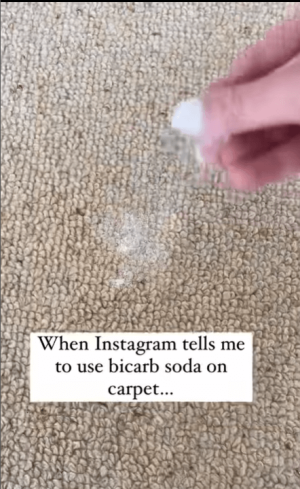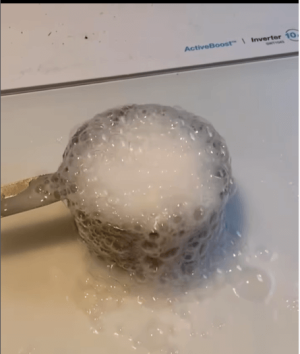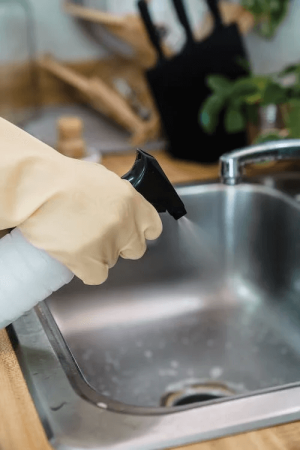Never follow these three popular cleaning ‘hacks’, warns a professional cleaner
- Replies 9
Trying to keep your home clean and tidy can sometimes feel like a full-time job in itself.
And with even less time on our hands these days, we're always looking for any kind of shortcut or 'hack' that will make the cleaning process a whole lot easier.
After all, it’s all about working smarter, not working harder, right?
But as much as we love finding new ways to get the job done quickly, there are some cleaning methods out there that are actually more trouble than they're worth — at least, according to one professional cleaner.
In a recent Instagram post, professional cleaner Kacie from The Big Clean Co shared three popular cleaning hacks that she would never use.
She also explained exactly why they don't work the way people think they do.
Read on to find out what they are so you can avoid making the same mistakes in your own home!
Bi-carb soda on carpet

One hack that Kacie said she regularly sees people recommend is using bi-carb soda (or ‘baking soda’ and 'bicarbonate of soda') on your carpet as a way to clean and deodorise it.
Unfortunately, this is one method you should definitely avoid if you want to keep your carpets in tip-top condition!
'The reason why I don't do this is because the particles are too small for your vacuum to completely suck up,’ Kacie said.
Instead, they end up attached to your carpet fibres and backing where they attract moisture and hold onto odours.
'And if your carpet is wool? You'll end up with unexplained browning weeks and months down the track.' she added.
Instead of using bi-carb soda, mix together one cup of distilled white vinegar with one cup of warm water in a spray bottle for an all-natural stain-busting solution that will neutralise odours.
Just spritz it over your entire carpet, allow it to air dry completely, then vacuum thoroughly afterwards… simple!
And don’t worry, the smell of vinegar will eventually vanish as the mixture dries.
Bi-carb soda & vinegar as drain clog busters

Mixing equal parts baking powder and vinegar and then pouring them down the drain might be another popular 'hack' you've seen people doing online… but unfortunately (just like with using them on carpets), this really isn't very effective either!
‘I know people think the reaction pushes out blockages in the drain, but this only works if you're able to close the drain around each end of the blockage to make it a controlled environment,' Kacie said.
'Don't believe me? Try this experiment in a bowl and see how much bi-carb is left behind unless you thoroughly stir the mixture.'
In other words: leave this one alone unless you want an overall bigger mess AND clog on your hands!
If you’re up for it, you could use stronger cleaning agents like caustic soda (sodium hydroxide) to unclog your drains.
You could even take things a step further by going the manual route: bent wire hangers and plungers!
Bi-carb soda & vinegar as a general spray cleaner
And finally, although many people mix bi-carb soda & vinegar together into some kind of generic all-purpose solution, Kacie is not a fan.
‘If you’re cleaning with bi-carb and vinegar as a spray? They’re just neutralising each other, it’s saltwater.’
Quick chemistry lesson: when bi-carb soda and vinegar react, they form three things: carbon dioxide, water, and sodium acetate.
Sodium acetate does have cleaning and antibacterial properties, but depending on the bi-carb soda and vinegar used, the amount of byproduct formed might not be apt for general use as a cleaning spray.
Fret not though, as you can use other combinations such as vinegar and water or water and dish soap for cleaning spray materials!

Be sure to be on the lookout in our Cleaning & Home Improvement forum for more tips on how to make your humble abode sparkling and clean!
If you have time, you may also like to check out another tip from Kacie about the key to getting more bang for the buck out of your cleaning products.
So, what is your reaction to this story? Do you agree with Kacie?
Share your thoughts and opinions below!
And with even less time on our hands these days, we're always looking for any kind of shortcut or 'hack' that will make the cleaning process a whole lot easier.
After all, it’s all about working smarter, not working harder, right?
But as much as we love finding new ways to get the job done quickly, there are some cleaning methods out there that are actually more trouble than they're worth — at least, according to one professional cleaner.
In a recent Instagram post, professional cleaner Kacie from The Big Clean Co shared three popular cleaning hacks that she would never use.
She also explained exactly why they don't work the way people think they do.
Read on to find out what they are so you can avoid making the same mistakes in your own home!
Bi-carb soda on carpet

Baking soda is a wonderful cleaning agent great for use in many situations. Screengrab Credit: Instagram/@thebigcleanco
One hack that Kacie said she regularly sees people recommend is using bi-carb soda (or ‘baking soda’ and 'bicarbonate of soda') on your carpet as a way to clean and deodorise it.
Unfortunately, this is one method you should definitely avoid if you want to keep your carpets in tip-top condition!
'The reason why I don't do this is because the particles are too small for your vacuum to completely suck up,’ Kacie said.
Instead, they end up attached to your carpet fibres and backing where they attract moisture and hold onto odours.
'And if your carpet is wool? You'll end up with unexplained browning weeks and months down the track.' she added.
Instead of using bi-carb soda, mix together one cup of distilled white vinegar with one cup of warm water in a spray bottle for an all-natural stain-busting solution that will neutralise odours.
Just spritz it over your entire carpet, allow it to air dry completely, then vacuum thoroughly afterwards… simple!
And don’t worry, the smell of vinegar will eventually vanish as the mixture dries.
Bi-carb soda & vinegar as drain clog busters

Kacie pointed out that the vinegar & bi-carb soda hack for unclogging drains only works in certain cases. Screengrab Credit: Instagram/@thebigcleanco
Mixing equal parts baking powder and vinegar and then pouring them down the drain might be another popular 'hack' you've seen people doing online… but unfortunately (just like with using them on carpets), this really isn't very effective either!
‘I know people think the reaction pushes out blockages in the drain, but this only works if you're able to close the drain around each end of the blockage to make it a controlled environment,' Kacie said.
'Don't believe me? Try this experiment in a bowl and see how much bi-carb is left behind unless you thoroughly stir the mixture.'
In other words: leave this one alone unless you want an overall bigger mess AND clog on your hands!
If you’re up for it, you could use stronger cleaning agents like caustic soda (sodium hydroxide) to unclog your drains.
You could even take things a step further by going the manual route: bent wire hangers and plungers!
Bi-carb soda & vinegar as a general spray cleaner
And finally, although many people mix bi-carb soda & vinegar together into some kind of generic all-purpose solution, Kacie is not a fan.
‘If you’re cleaning with bi-carb and vinegar as a spray? They’re just neutralising each other, it’s saltwater.’
Quick chemistry lesson: when bi-carb soda and vinegar react, they form three things: carbon dioxide, water, and sodium acetate.
Sodium acetate does have cleaning and antibacterial properties, but depending on the bi-carb soda and vinegar used, the amount of byproduct formed might not be apt for general use as a cleaning spray.
Fret not though, as you can use other combinations such as vinegar and water or water and dish soap for cleaning spray materials!
Key Takeaways
- Kacie, who runs The Big Clean Co. in Melbourne, said while many people recommend using bicarb soda on your carpet to clean it or mixing bicarb soda and vinegar to clean out blockages in your drain and as a spray, she doesn't think they work.
- The first hack Kacie said she never follows is using bicarb soda on the carpet. Many people do this to clean and deodorize all kinds of carpet and area rugs.
- The second thing Kacie said she avoids like the plague is mixing bicarb soda and vinegar into a solution and using them to unblock a drain.
- And the last one is not using a bi-carb soda and vinegar solution for cleaning spray as it's essentially 'saltwater'.
If you have time, you may also like to check out another tip from Kacie about the key to getting more bang for the buck out of your cleaning products.
So, what is your reaction to this story? Do you agree with Kacie?
Share your thoughts and opinions below!








